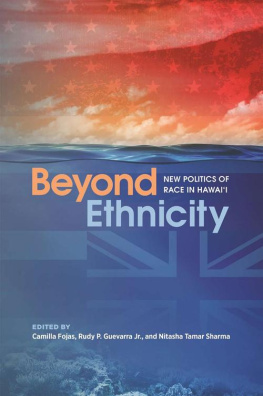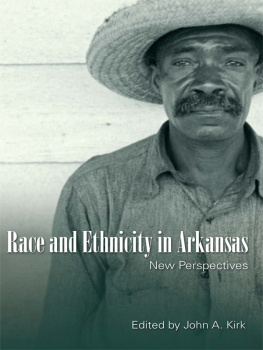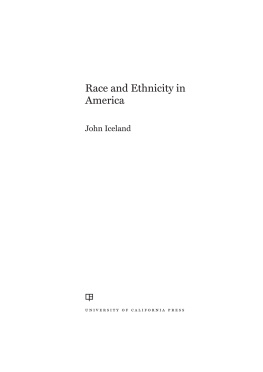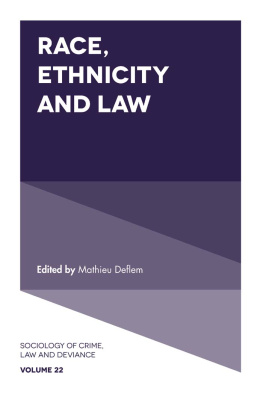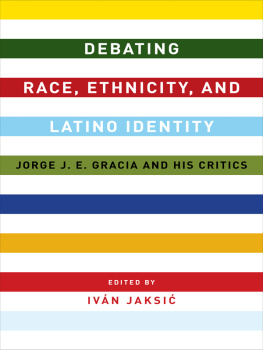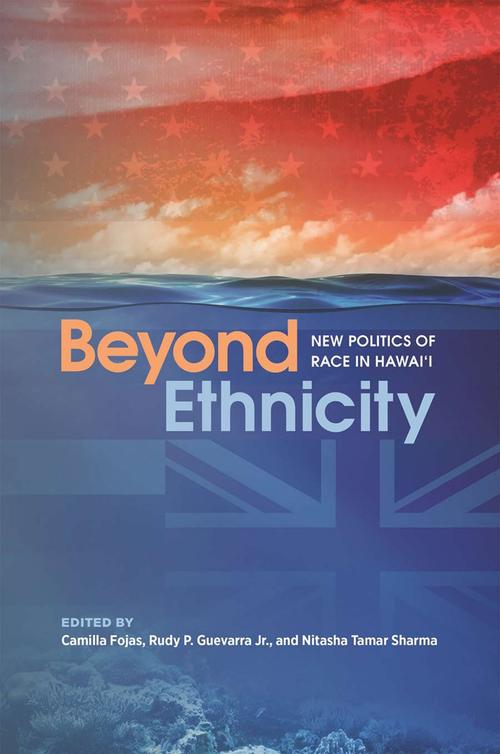2018 University of Hawaii Press
All rights reserved
Printed in the United States of America
23 22 21 20 19 18 6 5 4 3 2 1
Library of Congress Cataloging-in-Publication Data
Names: Fojas, Camilla, editor. | Guevarra, Rudy P., Jr., editor. | Sharma, Nitasha Tamar, editor.
Title: Beyond ethnicity: new politics of race in Hawaii / edited by Camilla Fojas, Rudy P. Guevarra Jr., Nitasha Tamar Sharma.
Description: Honolulu: University of Hawaii Press, [2018] | Includes bibliographical references and index. |
Identifiers: LCCN 2017036840 (print) | LCCN 2017038903 (ebook) | ISBN 9780824873530 (ebook) | ISBN 9780824869885 | ISBN 9780824869885 q(hardcover qalk. paper), Amazon Kindle 9780824873516, PDF 9780824873523
Subjects: LCSH: HawaiiRace relations. | HawaiiEthnic relations.
Classification: LCC DU624.6 (ebook) | LCC DU624.6 .B49 2018 (print) | DDC 323.1969dc23
LC record available at https://lccn.loc.gov/2017036840
Cover art: (Front) Grunge American flag by Vecteezy.com. Hawaiian sovereignty flag by Dbenbenn https://commons.wikimedia.org/wiki/File%3AFlag_of_Hawaii_Hawaiian_sovereignty.svg. Underwater coral reef seabed view with horizon and water surface split by waterline by Andrey Kuzmin/Shutterstock.com. (Back) Kanaka Maoli flag by ZooFari https://commons.wikimedia.org/wiki/File%3AKanaka_Maoli_flag.svg
University of Hawaii Press books are printed on acid-free paper and meet the guidelines for permanence and durability of the Council on Library Resources.
New Politics of Race in Hawaii
CAMILLA FOJAS, RUDY P. GUEVARRA JR., AND NITASHA TAMAR SHARMA
Behind the veneer of Hawaiis myth as a melting pot paradise are complicated and historically rooted cross-racial dynamics. Race, however, has not been the primary paradigm through which Hawaii has been understood. Racial inequality is disruptive. It ruptures the image of tolerance, diversity, and happiness upon which tourism, business, and so many vested transnational interests in the islands are based. Beyond Ethnicity analyzes contemporary race relations in Hawaii by focusing on the experiences and representations of marginalized and often unacknowledged groups, including Blacks, Micronesians, and Latina/os. The bulk of scholarship on group dynamics in Hawaii deploys ethnicity and culture as the primary lens of analysis, which tends to foreground the experiences of communities that arrived during Hawaiis plantation era, including the Japanese and Filipinos. Beyond Ethnicity analyzes each of these groups and foregrounds the role of Knaka MaoliNative Hawaiiansin this narrative. We wish neither to equate Hawaiians with all other groups in Hawaii as just another ethnic group, nor do we see race as the primary or only lens through which to analyze Hawaiians. Rather, this volume focuses on the distinctions and intersections of race, indigeneity, culture, and ethnicity in order to more fully understand inequality and community formation.
Our focus on race coincides with that of scholars across the Pacific and in U.S. ethnic studies who have encouraged new analyses that incorporate ethnic studies concepts (e.g., race) with more local (e.g., Knaka Maoli) and regional (e.g., Pacific Islander) notions and practices. That is, we bring together the racial frames of the Pacific with those of the continental United States. The (Uperesa, Salesa, Guevarra, Fojas, Sharma) intersectional, synchronic, and diachronic examination of gender, race, race mixing, and indigeneity in the Pacific stands in contrast to the ways that U.S. scholars and other writers instrumentalize the Pacific, and specifically Hawaii, as a laboratoryan experiment that might presciently forecast continental U.S. multiracial harmony. In 2014, former University of Hawaii ethnic studies professor Lisa Uperesa introduced a panel on race in Hawaii with the following directive: she argues that it is the panels task to enunciate the generative potential of race in our examination and analyses of life in the Pacific, tracing how it interacts with the more privileged frameworks of culture, ethnicity, and indigeneity. She encourages scholars to consider questions about race and racialization because their importance in historical and contemporary life in the Pacific deserves a more sustained conversation across island areas. The work in this volume responds, in part, to this exhortation to rethink the history, politics, and cultural formations of the Pacific along new lines, lines that may evoke both discomfort and resistance. The stakes of this debate are evident in the multipleat times competingconceptions of how race intersects with indigeneity, ethnicity, and culture by the authors in this volume. Our multiple analyses illustrate the unsettled question of how power plays out within this highly diverse society.
According the 2010 U.S. Census data and subsequent reports, the five largest racial groups in Hawaii by population size included White, Filipino, Japanese, Native Hawaiian, and Chinese (see the figure for the top ten). Latina/os however, hold a uniqueand, one could argue, problematicposition in the U.S. Census because they are considered an ethnic group. According to census definitions, Hispanic or Latino refers to a person of Cuban, Mexican, Puerto Rican, South or Central American, or other Spanish culture or origin regardless of race. Currently Latina/os make up approximately 9.8 percent of Hawaiis population. If one were to consider Latina/os as a racial category, then their numbers would shift the list to include Mexicans and Puerto Ricans among the largest groups on the islands. In this way, with attention to understudied groups such as Latina/os, Micronesians, Blacks, and mixed-race people, alongside those more traditionally associated with Hawaii, such as Japanese, Hawaiians, and Filipinos, this volume charts how the changing composition and economies of the islands affect race relations and life in Hawaii. Beyond Ethnicity brings Pacific Islander and continental U.S. racial frames together to analyze Knaka Maoli, long-term residents, and newcomer interactions to analyze power, culture, and resource distribution in Hawaii.

